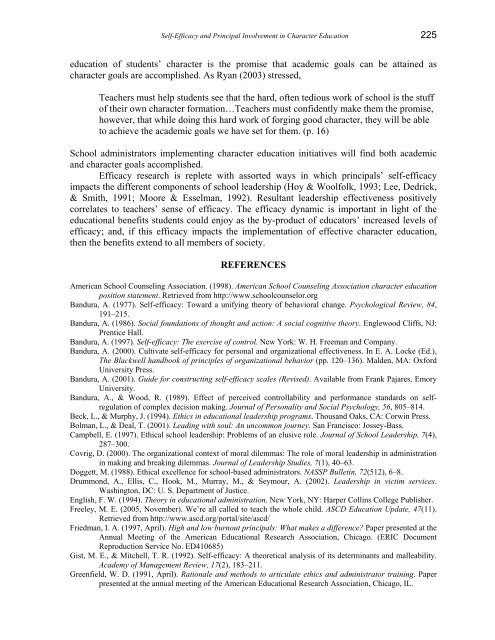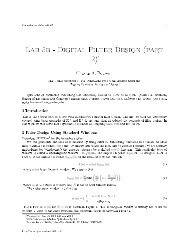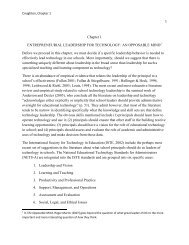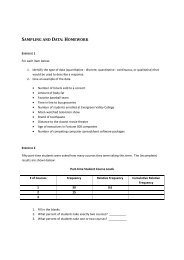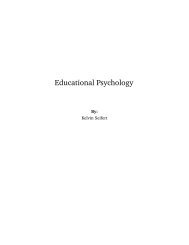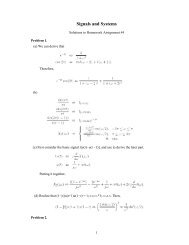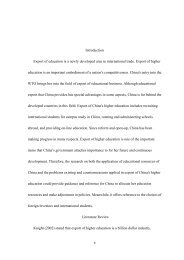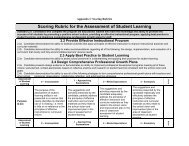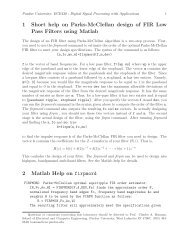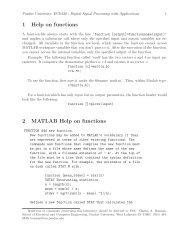Blazing New Trails - Connexions
Blazing New Trails - Connexions
Blazing New Trails - Connexions
You also want an ePaper? Increase the reach of your titles
YUMPU automatically turns print PDFs into web optimized ePapers that Google loves.
Self-Efficacy and Principal Involvement in Character Education 225<br />
education of students’ character is the promise that academic goals can be attained as<br />
character goals are accomplished. As Ryan (2003) stressed,<br />
Teachers must help students see that the hard, often tedious work of school is the stuff<br />
of their own character formation…Teachers must confidently make them the promise,<br />
however, that while doing this hard work of forging good character, they will be able<br />
to achieve the academic goals we have set for them. (p. 16)<br />
School administrators implementing character education initiatives will find both academic<br />
and character goals accomplished.<br />
Efficacy research is replete with assorted ways in which principals’ self-efficacy<br />
impacts the different components of school leadership (Hoy & Woolfolk, 1993; Lee, Dedrick,<br />
& Smith, 1991; Moore & Esselman, 1992). Resultant leadership effectiveness positively<br />
correlates to teachers’ sense of efficacy. The efficacy dynamic is important in light of the<br />
educational benefits students could enjoy as the by-product of educators’ increased levels of<br />
efficacy; and, if this efficacy impacts the implementation of effective character education,<br />
then the benefits extend to all members of society.<br />
REFERENCES<br />
American School Counseling Association. (1998). American School Counseling Association character education<br />
position statement. Retrieved from http://www.schoolcounselor.org<br />
Bandura, A. (1977). Self-efficacy: Toward a unifying theory of behavioral change. Psychological Review, 84,<br />
191–215.<br />
Bandura, A. (1986). Social foundations of thought and action: A social cognitive theory. Englewood Cliffs, NJ:<br />
Prentice Hall.<br />
Bandura, A. (1997). Self-efficacy: The exercise of control. <strong>New</strong> York: W. H. Freeman and Company.<br />
Bandura, A. (2000). Cultivate self-efficacy for personal and organizational effectiveness. In E. A. Locke (Ed.),<br />
The Blackwell handbook of principles of organizational behavior (pp. 120–136). Malden, MA: Oxford<br />
University Press.<br />
Bandura, A. (2001). Guide for constructing self-efficacy scales (Revised). Available from Frank Pajares, Emory<br />
University.<br />
Bandura, A., & Wood, R. (1989). Effect of perceived controllability and performance standards on selfregulation<br />
of complex decision making. Journal of Personality and Social Psychology, 56, 805–814.<br />
Beck, L., & Murphy, J. (1994). Ethics in educational leadership programs. Thousand Oaks, CA: Corwin Press.<br />
Bolman, L., & Deal, T. (2001). Leading with soul: An uncommon journey. San Francisco: Jossey-Bass.<br />
Campbell, E. (1997). Ethical school leadership: Problems of an elusive role. Journal of School Leadership, 7(4),<br />
287–300.<br />
Covrig, D. (2000). The organizational context of moral dilemmas: The role of moral leadership in administration<br />
in making and breaking dilemmas. Journal of Leadership Studies, 7(1), 40–63.<br />
Doggett, M. (1988). Ethical excellence for school-based administrators. NASSP Bulletin, 72(512), 6–8.<br />
Drummond, A., Ellis, C., Hook, M., Murray, M., & Seymour, A. (2002). Leadership in victim services.<br />
Washington, DC: U. S. Department of Justice.<br />
English, F. W. (1994). Theory in educational administration. <strong>New</strong> York, NY: Harper Collins College Publisher.<br />
Freeley, M. E. (2005, November). We’re all called to teach the whole child. ASCD Education Update, 47(11).<br />
Retrieved from http://www.ascd.org/portal/site/ascd/<br />
Friedman, I. A. (1997, April). High and low burnout principals: What makes a difference? Paper presented at the<br />
Annual Meeting of the American Educational Research Association, Chicago. (ERIC Document<br />
Reproduction Service No. ED410685)<br />
Gist, M. E., & Mitchell, T. R. (1992). Self-efficacy: A theoretical analysis of its determinants and malleability.<br />
Academy of Management Review, 17(2), 183–211.<br />
Greenfield, W. D. (1991, April). Rationale and methods to articulate ethics and administrator training. Paper<br />
presented at the annual meeting of the American Educational Research Association, Chicago, IL.


